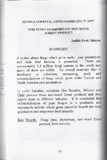| dc.rights.license | http://creativecommons.org/licenses/by-nc-sa/3.0/ve/ | es_VE |
| dc.contributor.author | Petit Aldana, Judith | |
| dc.date.accessioned | 2024-04-08T15:51:56Z | |
| dc.date.available | 2024-04-08T15:51:56Z | |
| dc.date.issued | 2024-04-08 | |
| dc.identifier.issn | 0798-2437 | |
| dc.identifier.uri | http://www.saber.ula.ve/handle/123456789/50356 | |
| dc.description.abstract | Se presenta una revisión sobre los hongos que crecen bajo los pinares y su función alimenticia. Existen aproximadamente 1,5 millones de especies de hongos en el mundo y muchos de ellos son comestibles. Hay toda una economía que se desarrolla en la recolección, procesamiento, almacenamiento y comercialización de los hongos que crecen bajo los pinares de Europa y América del Norte. En América Latina países como Ecuador, México y Chile procesan este producto forestal no maderable y lo exportan a diferentes latitudes. Se concluye que la industrialización del hongo del pino es una actividad rentable que proporciona beneficios equitativos para las poblaciones rurales y fortalecen la seguridad alimentaria de la población en general. | es_VE |
| dc.language.iso | es | es_VE |
| dc.rights | info:eu-repo/semantics/openAccess | es_VE |
| dc.subject | Hongos | es_VE |
| dc.subject | Plantación de pinos | es_VE |
| dc.subject | Producto forestal no maderable | es_VE |
| dc.subject | Seguridad alimentaria | es_VE |
| dc.title | Hongos del pino un producto forestal no maderable de importancia | es_VE |
| dc.title.alternative | Pine fungi an important non-wood forest product | es_VE |
| dc.type | info:eu-repo/semantics/article | es_VE |
| dc.description.abstract1 | A review about fungi which grow under pine plantations and their feed funtion, is presented. There are aproximately 1.5 million fungi species in the world and many of them are edible. An overall economy that is developed in collection, processing, stock and comercialization of fungi which grow under Europe and North America pine plantations.
In Latin America, countries like Ecuador, México and Chile process these non-wood forest products and they export them to different latitudes. It is concluded that industrialization of pine fungus is a profitable and sustainable activity which gives equitable benefit for rural population and empowers food security. | es_VE |
| dc.description.colacion | 54-69 | es_VE |
| dc.description.dependencia | Instituto Forestal Latinoamericano (IFLA) | es |
| dc.description.email | ifla@ula.ve / ifla.ifla@gmail.com. | es_VE |
| dc.description.email | jcpetita@ula.ve | es_VE |
| dc.description.frecuencia | Semestral | |
| dc.description.paginaweb | http://www.saber.ula.ve/forestalatinoamericana/ | es |
| dc.identifier.depositolegal | PP198102 ME 433 | es |
| dc.publisher.pais | Venezuela | es_VE |
| dc.subject.facultad | Facultad de Ciencias Forestales y Ambientales | es_VE |
| dc.subject.institucion | Universidad de Los Andes | es_VE |
| dc.subject.keywords | Fungi pine | es_VE |
| dc.subject.keywords | Plantations | es_VE |
| dc.subject.keywords | Non-wood forest product | es_VE |
| dc.subject.keywords | Food security | es_VE |
| dc.subject.seccion | Revista Forestal Latinoamericana: Artículos | es_VE |
| dc.subject.tipo | Revistas | es_VE |
| dc.type.media | Texto | es_VE |


